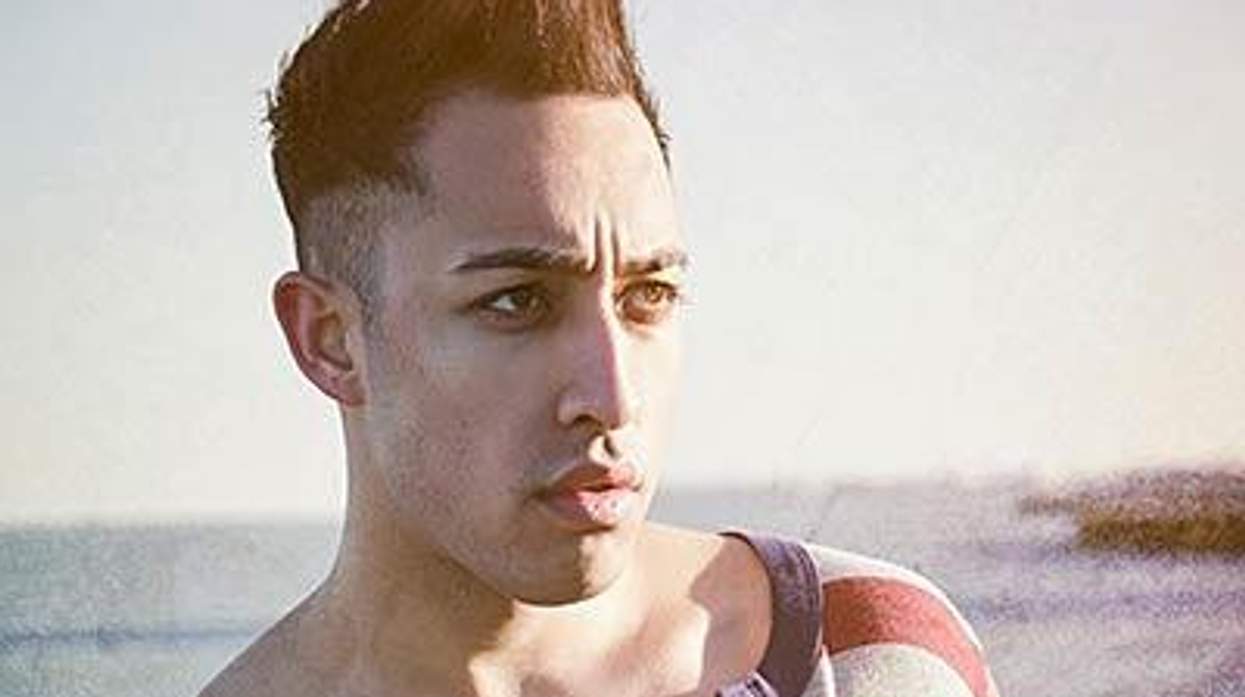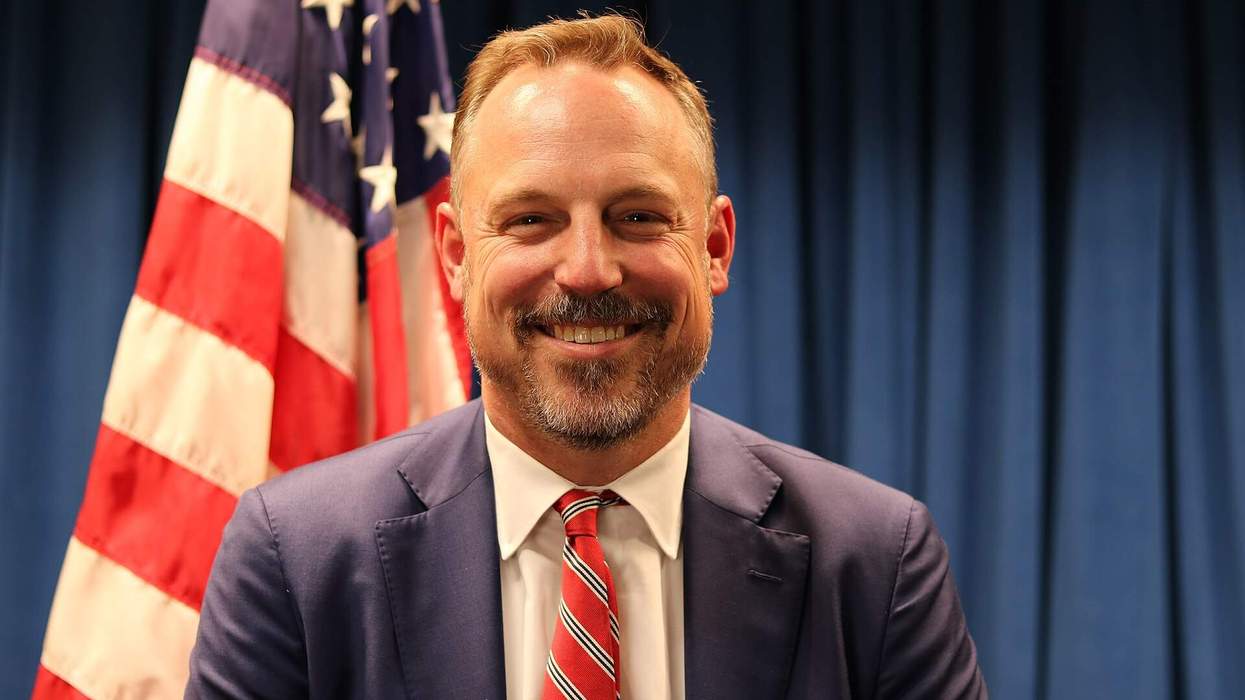UPDATE: The post referenced in this op-ed has been removed, and the National LGBTQ Task Force has apologized for its publication and timing, writing "Our commitment as we move forward with our partners in the bisexual community is to continue to raise awareness of the realities and history of the bisexual community and bisexual people's lives."
---
Last month the National Gay and Lesbian Task Force (now the National LGBTQ Task Force) published a blog post by its leadership programs director, Evangeline Weiss, in which she says she is ready "to say bye bye to the word bisexuality." Weiss shares her experience, in which she says bisexuality "is not an accurate description" of her sexual orientation, and then encourages readers to also say no to the word bisexual.
Normally, a think piece like this would perhaps rub me the wrong way, as I am someone who identifies as bisexual. But this didn't just annoy me. This piece was published on Celebrate Bisexuality Day, just a few hours after the Task Force team received bisexual competency training from BiNet USA. To recap: Weiss, who does not identify as bisexual anymore, erases bisexual people on a day when we were supposed to celebrate bisexuality. On the blog of one of the largest LGBT organizations.
But let's get to the root of her argument. Weiss argues that bisexuality reinforces a gender binary and traps transgender, gender-nonconforming, queer, and genderqueer people. Weiss argues that because the word bisexual has bi in it, it must reinforce gender binaries and is exclusive.
"For me, bisexuality is essentially linked to gender," Weiss writes. "Because the fluidity of desire is outside the confines of gender for me, I believe bisexuality is about being oriented outside gender. Which may be a reason why my love, respect and closeness to trans people and to transgender justice work has been so intense, personal and instrumental to my own liberation. I am always amazed by the diversity of how my transgender friends think about and embody their identities, often in defiance of any kind of established order."
As someone who struggles every day to be the best ally to trans and gender-nonconforming people that I can be, I would have completely bought into her argument -- if I didn't know that bisexuality wasn't actually binary. Or if I was unaware of the history of the word bisexual.
The word bisexual, which has bi -- two in Latin prefixes -- doesn't have to mean male and female. As explained by the Bisexual Resource Center, "For many bisexuals, the 'bi' in 'bisexual' refers not to male plus female, but to attraction to genders like our own, plus attraction to genders different from our own. In other words, it's the ability to move in two directions along a continuum of multiple genders."
The definition that bisexual organizations use is one from renowned bisexual activist Robyn Ochs, who says, "I call myself bisexual because I acknowledge that I have in myself the potential to be attracted -- romantically and/or sexually -- to people of more than one sex and/or gender, not necessarily at the same time, not necessarily in the same way, and not necessarily to the same degree."
As I wrote just a few weeks ago, "Bisexuality threatens the heteronormative narrative even more than even homosexuality, because it destroys our ideas of a binary; it's an acknowledgment that humans sexuality works in a more complex manner than only having romantic and sexual attractions for one gender."
But it's not just that the word isn't binary. Trying to eliminate the word bisexual erases our experiences. Author and transgender activist Julia Serano, who tweeted the Task Force in protest of the piece, wrote, "The 'bi' in bisexual does not merely refer to the types of people that I am sexual with, but to the fact that both the straight and queer worlds view me in two very different ways depending upon who I happen to be partnered with at any given moment. This aspect of the bisexual experience is not captured by the word 'pansexual,' nor by the more general word 'queer.' In fact, I regularly call myself queer, and when I do, people often are surprised when I mention that I date men (as though in their minds, bisexuality does not truly fall under the queer umbrella)."
Historically, bisexual has not reinforced binaries, it has spoken directly to experience, and genderqueer and transgender people have defended its use. So why would the Task Force publish such a piece? Mark Daley, chief communications and marketing officer, told me in an email, "We featured a range of personal voices in social media during Bisexual Awareness Week including some of those of our staff. The blog from the Task Force's Evangeline Weiss represents her personal experience in defining herself and her identity and how that has changed for her. Clearly this blog has produced some strong opinions both positive and negative. In fact we have published one blog already that presents a counter view."
The excellent counterview by Aud Taher, a bisexual transgender person, calls Weiss' piece biphobic. Although the Task Force running the piece is a good thing, it doesn't erase the clear double standard -- the Task Force would never run a piece that was homophobic or erasing of gay and lesbian identities. Bisexual people are part of the queer community, and we shouldn't have to be defending ourselves to an organization that claims to be inclusive of us. We wouldn't stand for homophobia and we shouldn't stand for biphobia.
While I respect Weiss's journey and right to self-identify, I can't stay silent when in her process she attempts to negate my identity. Anyone is welcome to use whatever terms suits them best, whether it's queer, pansexual, bisexual, or any number of labels that are created every year. But to police others' identities goes against everything our community fights for on a daily basis. That's why the Task Force owes bisexual people an apology.
They shouldn't stop at an apology. The Task Force should include bi-specific programming, invite bisexual speakers to its events, and engage bisexual people. We should see tangible results. Because an organization that labels itself as inclusive of the LGBT community should be working to address the specific needs of all of its members.
The Task Force shouldn't have run that clearly biphobic piece on the sole day that is dedicated to celebrating bisexuals. We deserve better.
ELIEL CRUZ is a writer on issues concerning bisexuality for The Advocate. He believes in breaking down binaries and radical intersectional inclusiveness. Follow him on twitter @elielcruz
*The Task Force recently changed its name to a much more inclusive one. It should be commended for that step. Hopefully, that inclusiveness will be extended in how it speaks about the bisexual community in the future.















Charlie Kirk DID say stoning gay people was the 'perfect law' — and these other heinous quotes
These are some of his worst comments about LGBTQ+ people made by Charlie Kirk.